中考专区二轮专题-----通过论语学习定语从句 课件(32张PPT)
文档属性
| 名称 | 中考专区二轮专题-----通过论语学习定语从句 课件(32张PPT) |  | |
| 格式 | pptx | ||
| 文件大小 | 9.4MB | ||
| 资源类型 | 教案 | ||
| 版本资源 | 通用版 | ||
| 科目 | 英语 | ||
| 更新时间 | 2022-07-09 12:55:57 | ||
图片预览

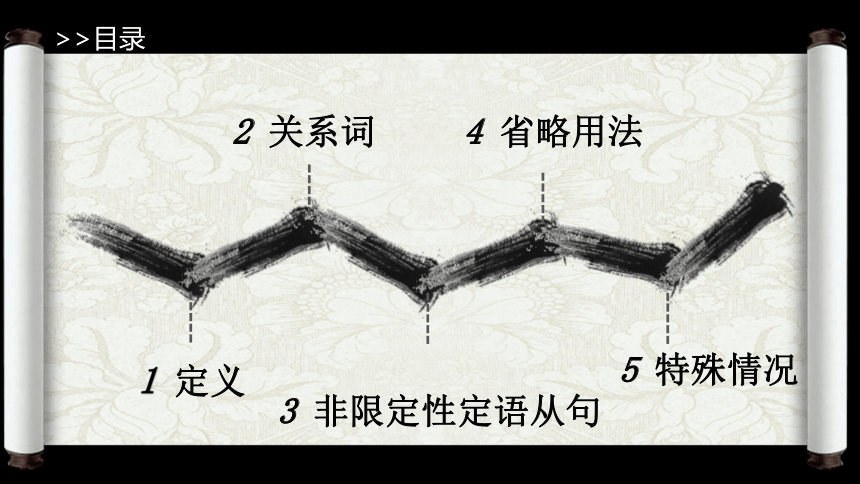

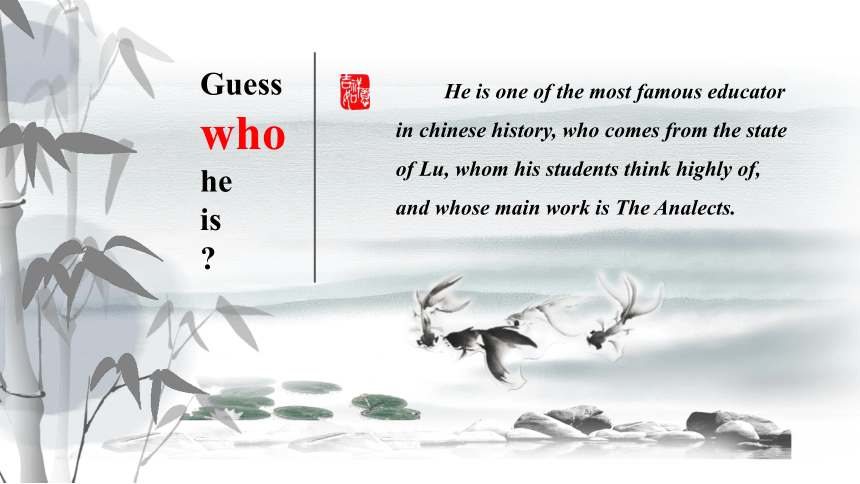
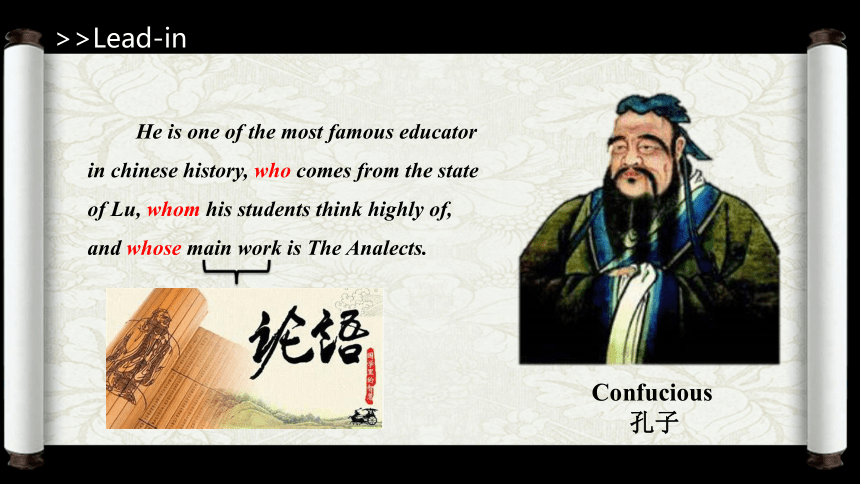
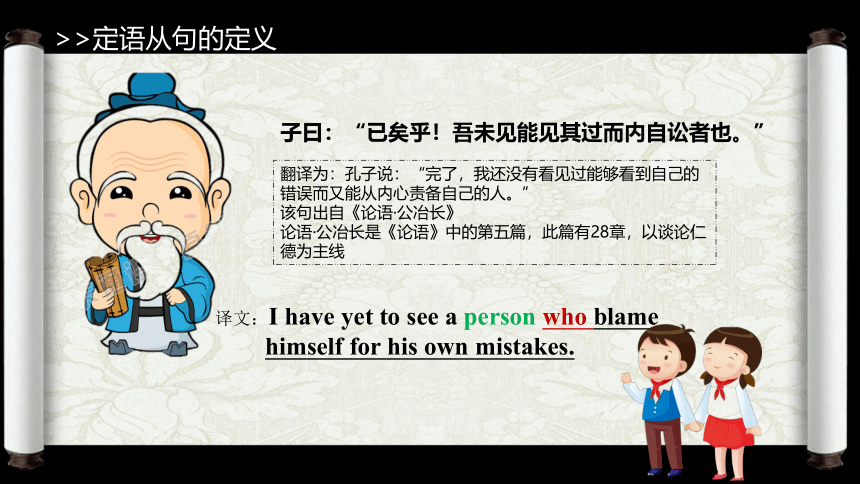
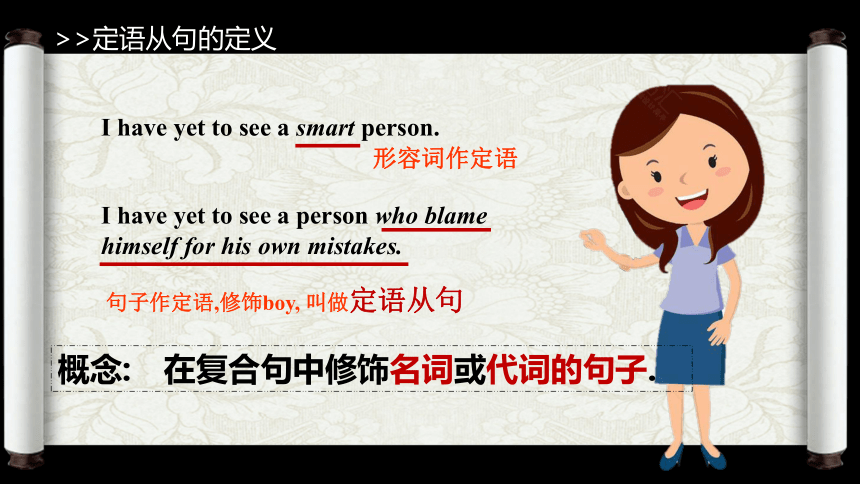
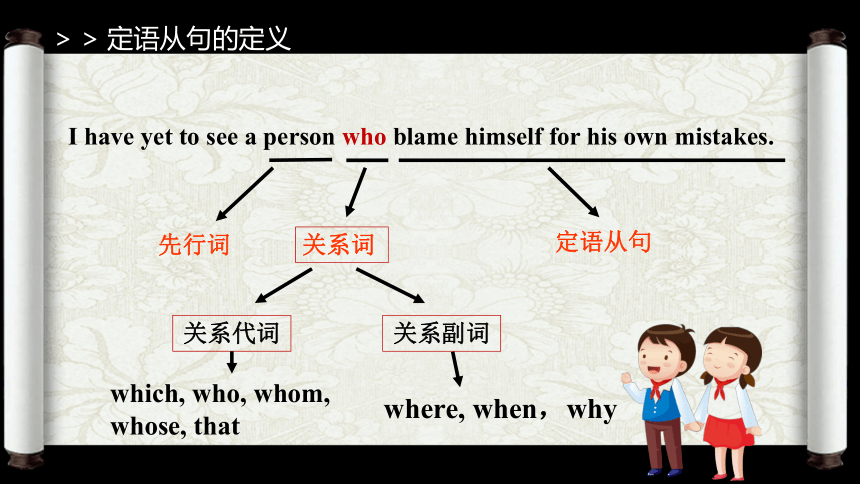
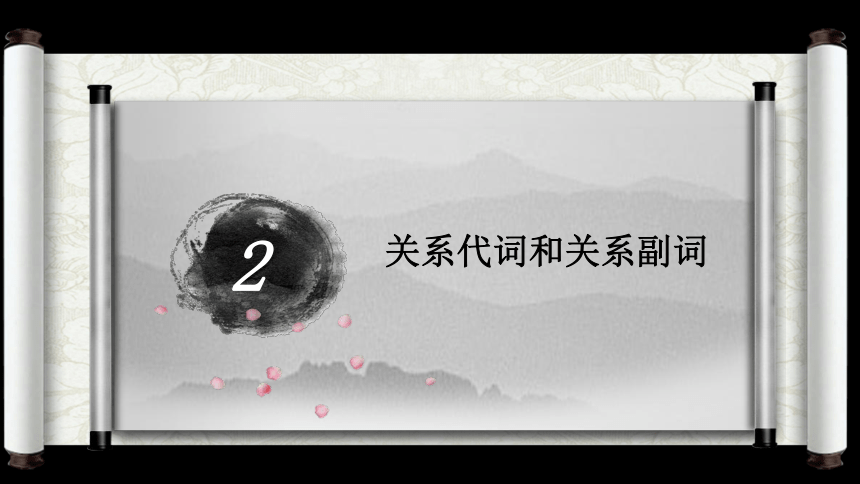
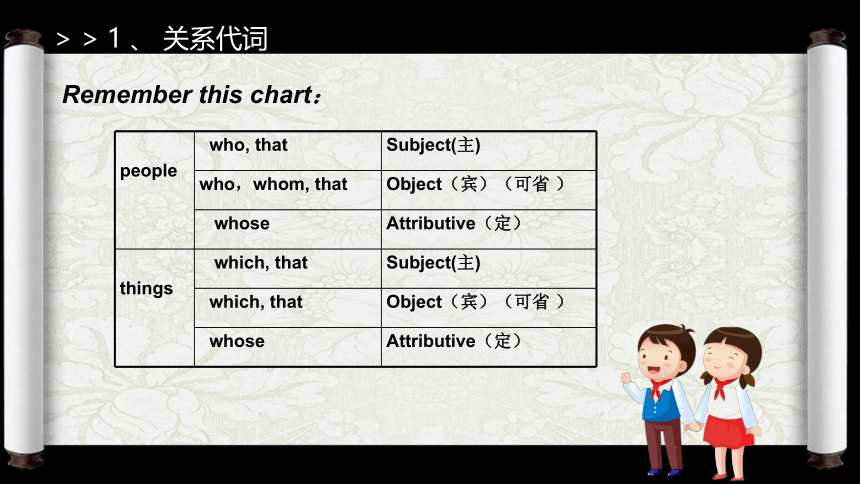


文档简介
(共32张PPT)
通过《论语》学习定语从句
2 关系词
4 省略用法
3 非限定性定语从句
1 定义
5 特殊情况
>>目录
1
定语从句的定义
He is one of the most famous educator in chinese history, who comes from the state of Lu, whom his students think highly of, and whose main work is The Analects.
Guess
who
he
is
>>Lead-in
He is one of the most famous educator in chinese history, who comes from the state of Lu, whom his students think highly of, and whose main work is The Analects.
Confucious
孔子
>>定语从句的定义
译文:I have yet to see a person who blame
himself for his own mistakes.
子曰:“已矣乎!吾未见能见其过而内自讼者也。”
翻译为:孔子说:“完了,我还没有看见过能够看到自己的错误而又能从内心责备自己的人。”
该句出自《论语·公冶长》
论语·公冶长是《论语》中的第五篇,此篇有28章,以谈论仁德为主线
>>定语从句的定义
I have yet to see a person who blame
himself for his own mistakes.
I have yet to see a smart person.
形容词作定语
句子作定语,修饰boy, 叫做定语从句
概念: 在复合句中修饰名词或代词的句子.
>>定语从句的定义
I have yet to see a person who blame himself for his own mistakes.
先行词
关系词
定语从句
关系代词
关系副词
which, who, whom, whose, that
where, when,why
2
关系代词和关系副词
>>1、关系代词
people who, that Subject(主)
who,whom, that Object(宾)(可省 )
whose Attributive(定)
things which, that Subject(主)
which, that Object(宾)(可省 )
whose Attributive(定)
Remember this chart:
>>关系代词who
The one who merely knows the value of study is not so good as the one who takes an interest in studying. The one who takes an interest in studying is not so good as the one who delights in studying.
子曰:知之者不如好之者,好之者不如乐之者
孔子说:“懂得学习的人比不上喜爱学习的人;喜爱学习的人比不上以此为乐的人。”孔老夫子的这句话讲的是关于兴趣对于学习的重要性。学习知识重要的是培养学习的兴趣,俗话说“兴趣是最好的老师”。对知识的学习感兴趣,就会变被动为主动,以学习为乐事,在快乐中学习,既能提高学习的效率,还能加深对知识的理解,这样学到的知识才能灵活地运用。
这里的who修饰人,作主语
>>关系代词who/whom/that
The village honest man who/whom/that everyone believes to be honest and supportive but is actually a back-stabbing double-talker, is the bandit of virtue.
子曰:乡愿,德之贼也。
孔子说:没有原则而去投人所好的人,是足以败坏道德的小人。孔子为什么这样说呢?“乡愿”,也就是“向愿”,即揣测他人心思、谄媚别人而达到一己私欲,如为了讨好领导而拍马屁、为了招揽客户而不择手段......
“乡愿”给人的感觉待人热情、八面玲珑,但这样的人却用冠冕堂皇的表面文章扰乱了人们对德行的标准。
who/whom/that 这里修饰人,作宾语
>>关系代词whose
A person whose culture and rusticity are perfectly
balanced is a gentleman.
子曰:质胜文则野,文胜质则史。文质彬彬,然后君子。
孔子说:质朴多于文采,就会显得粗野,文采多于质朴,就会显得虚伪。文采和质朴兼具,然后才会成为君子
whose 作宾语,...的
>>关系代词which
There are three things which the superior man guards against. In youth, when the physical powers, are not yet settled, he guards against lust. When he is strong and the physical powers are full of vigor, he guards against quarrelsomeness. When he is old, and the animal powers are decayed, he guards against covetousness.
子曰:君子有三戒。少之时,血气未定,戒之在色。及其壮也,血气方刚,戒之在斗。及其老也,血气既衰,戒之在得。
that修饰物,作宾语
>>1、关系副词
Remember this chart:
>>1、关系副词
While his parents are alive, the son may not go abroad to a distance. If he does go abroad, he must have a fixed place to which /where he goes.
子曰:父母在,不远游,游必有方。
古人讲父母老了,怕没人照应,而不远游,即使要远游,子女必须对父母有个安顿的方法,对自己的出行有个正当的缘由,这是孝子之道。“方”者应是方法,不是方向。
to which /where 作地点状语
>>2、关系副词
At the time when Confucius passed away, his disciples, grateful for their master's continual kindness, observed a three-year mourning period at Zigong's behest.
when 作时间状语
>>3、关系副词
The reason why some of the disciples joureyed to various states to provide their services and transmit Confucius' teachings is that the rulers of the time were always seeking talent.
why 作原因状语
3
非限定性定语从句
>>非限定性定语从句
>>非限定性定语从句
The village honest man , whom everyone believes to be honest and supportive but is actually a back-stabbing double-talker, is the bandit of virtue.
子曰:乡愿,德之贼也。
孔子说:没有原则而去投人所好的人,是足以败坏道德的小人。孔子为什么这样说呢?“乡愿”,也就是“向愿”,即揣测他人心思、谄媚别人而达到一己私欲,如为了讨好领导而拍马屁、为了招揽客户而不择手段......
“乡愿”给人的感觉待人热情、八面玲珑,但这样的人却用冠冕堂皇的表面文章扰乱了人们对德行的标准。
这里的whom不能用who/that
>>非限定性定语从句
Zixia, who later came to be known as the "transmitter of the classics, "accepted an invitation to assist Marquis Wen of Wei, and there he took on the role of instructor to the students of Wei.
The place soon became a shrine , which people could go to pay homage to the Confucian ideal.
4
省略用法
>>1、关系代词作宾语时的省略
The village honest man who/whom/that/ \ everyone believes to be honest and supportive but is actually a back-stabbing double-talker, is the bandit of virtue.
子曰:乡愿,德之贼也。
孔子说:没有原则而去投人所好的人,是足以败坏道德的小人。孔子为什么这样说呢?“乡愿”,也就是“向愿”,即揣测他人心思、谄媚别人而达到一己私欲,如为了讨好领导而拍马屁、为了招揽客户而不择手段......
“乡愿”给人的感觉待人热情、八面玲珑,但这样的人却用冠冕堂皇的表面文章扰乱了人们对德行的标准。
who/whom/that 作宾语,可省略
>>2、关系代词的省略
当先行词是reason, place, the day, the time, every time, each time, the moment, 关系副词可以省略。
At the time when/ \ / Confucius passed away, his disciples, grateful for their master's continual kindness, observed a three-year mourning period at Zigong's behest.
when前有the time,可省略
>>3、当先行词是way时
It's the people who can exalt the way, not the way that /in which/ \ / that can exalt people.
子曰:人能弘道,非道弘人
弘是廓大之意,那么道究竟指什么道?儒家、道家甚至法家都有谈及道,但他们的道各不相同。孔子所言之道,是儒家的道,是仁道。因此,这八个字,字面意思是说:人能够把道廓大,不是用道来廓大人。
这里的that/in which 可省略
5
特殊用法
>>1、只用that、不用which的5种情况
The village honest man that everyone believes to be honest and supportive but is actually a back-stabbing double-talker, is the bandit of virtue.
这里不能用which
子曰:乡愿,德之贼也。
1) 当先行词是:all , any , anything , everything , nothing the
one, much, few, little或被它们修饰时。
2)当先行词被形容词的最高级或序数词修饰时。
3)当先行词有:the only , the very , the same , the last 等修饰时。
4)当主句以who或which开头时,定语从句中引导词用that ,不
用which 或 who 。以避免重复。
5)当先行词既有人又有物时,用that 。
>>2、只用which、不用that的情况
The place soon became a shrine , which people could go to pay homage to the Confucian ideal.
1.在非限定性定语从句中,无论如何也不能用that
2.关系代词前面出现介词时
3.当先行词本身为that(指代)时
4当先行词是baby, child等词时
>>课堂总结
>>家庭作业
根据在自己的理解,用英语介绍孔子及他的著作《论语》,可以参照下面这段话:
He is one of the most famous educator in chinese history, who comes from the state of Lu, whom his students think highly of, and whose main work is The Analects.
Thank you
通过《论语》学习定语从句
2 关系词
4 省略用法
3 非限定性定语从句
1 定义
5 特殊情况
>>目录
1
定语从句的定义
He is one of the most famous educator in chinese history, who comes from the state of Lu, whom his students think highly of, and whose main work is The Analects.
Guess
who
he
is
>>Lead-in
He is one of the most famous educator in chinese history, who comes from the state of Lu, whom his students think highly of, and whose main work is The Analects.
Confucious
孔子
>>定语从句的定义
译文:I have yet to see a person who blame
himself for his own mistakes.
子曰:“已矣乎!吾未见能见其过而内自讼者也。”
翻译为:孔子说:“完了,我还没有看见过能够看到自己的错误而又能从内心责备自己的人。”
该句出自《论语·公冶长》
论语·公冶长是《论语》中的第五篇,此篇有28章,以谈论仁德为主线
>>定语从句的定义
I have yet to see a person who blame
himself for his own mistakes.
I have yet to see a smart person.
形容词作定语
句子作定语,修饰boy, 叫做定语从句
概念: 在复合句中修饰名词或代词的句子.
>>定语从句的定义
I have yet to see a person who blame himself for his own mistakes.
先行词
关系词
定语从句
关系代词
关系副词
which, who, whom, whose, that
where, when,why
2
关系代词和关系副词
>>1、关系代词
people who, that Subject(主)
who,whom, that Object(宾)(可省 )
whose Attributive(定)
things which, that Subject(主)
which, that Object(宾)(可省 )
whose Attributive(定)
Remember this chart:
>>关系代词who
The one who merely knows the value of study is not so good as the one who takes an interest in studying. The one who takes an interest in studying is not so good as the one who delights in studying.
子曰:知之者不如好之者,好之者不如乐之者
孔子说:“懂得学习的人比不上喜爱学习的人;喜爱学习的人比不上以此为乐的人。”孔老夫子的这句话讲的是关于兴趣对于学习的重要性。学习知识重要的是培养学习的兴趣,俗话说“兴趣是最好的老师”。对知识的学习感兴趣,就会变被动为主动,以学习为乐事,在快乐中学习,既能提高学习的效率,还能加深对知识的理解,这样学到的知识才能灵活地运用。
这里的who修饰人,作主语
>>关系代词who/whom/that
The village honest man who/whom/that everyone believes to be honest and supportive but is actually a back-stabbing double-talker, is the bandit of virtue.
子曰:乡愿,德之贼也。
孔子说:没有原则而去投人所好的人,是足以败坏道德的小人。孔子为什么这样说呢?“乡愿”,也就是“向愿”,即揣测他人心思、谄媚别人而达到一己私欲,如为了讨好领导而拍马屁、为了招揽客户而不择手段......
“乡愿”给人的感觉待人热情、八面玲珑,但这样的人却用冠冕堂皇的表面文章扰乱了人们对德行的标准。
who/whom/that 这里修饰人,作宾语
>>关系代词whose
A person whose culture and rusticity are perfectly
balanced is a gentleman.
子曰:质胜文则野,文胜质则史。文质彬彬,然后君子。
孔子说:质朴多于文采,就会显得粗野,文采多于质朴,就会显得虚伪。文采和质朴兼具,然后才会成为君子
whose 作宾语,...的
>>关系代词which
There are three things which the superior man guards against. In youth, when the physical powers, are not yet settled, he guards against lust. When he is strong and the physical powers are full of vigor, he guards against quarrelsomeness. When he is old, and the animal powers are decayed, he guards against covetousness.
子曰:君子有三戒。少之时,血气未定,戒之在色。及其壮也,血气方刚,戒之在斗。及其老也,血气既衰,戒之在得。
that修饰物,作宾语
>>1、关系副词
Remember this chart:
>>1、关系副词
While his parents are alive, the son may not go abroad to a distance. If he does go abroad, he must have a fixed place to which /where he goes.
子曰:父母在,不远游,游必有方。
古人讲父母老了,怕没人照应,而不远游,即使要远游,子女必须对父母有个安顿的方法,对自己的出行有个正当的缘由,这是孝子之道。“方”者应是方法,不是方向。
to which /where 作地点状语
>>2、关系副词
At the time when Confucius passed away, his disciples, grateful for their master's continual kindness, observed a three-year mourning period at Zigong's behest.
when 作时间状语
>>3、关系副词
The reason why some of the disciples joureyed to various states to provide their services and transmit Confucius' teachings is that the rulers of the time were always seeking talent.
why 作原因状语
3
非限定性定语从句
>>非限定性定语从句
>>非限定性定语从句
The village honest man , whom everyone believes to be honest and supportive but is actually a back-stabbing double-talker, is the bandit of virtue.
子曰:乡愿,德之贼也。
孔子说:没有原则而去投人所好的人,是足以败坏道德的小人。孔子为什么这样说呢?“乡愿”,也就是“向愿”,即揣测他人心思、谄媚别人而达到一己私欲,如为了讨好领导而拍马屁、为了招揽客户而不择手段......
“乡愿”给人的感觉待人热情、八面玲珑,但这样的人却用冠冕堂皇的表面文章扰乱了人们对德行的标准。
这里的whom不能用who/that
>>非限定性定语从句
Zixia, who later came to be known as the "transmitter of the classics, "accepted an invitation to assist Marquis Wen of Wei, and there he took on the role of instructor to the students of Wei.
The place soon became a shrine , which people could go to pay homage to the Confucian ideal.
4
省略用法
>>1、关系代词作宾语时的省略
The village honest man who/whom/that/ \ everyone believes to be honest and supportive but is actually a back-stabbing double-talker, is the bandit of virtue.
子曰:乡愿,德之贼也。
孔子说:没有原则而去投人所好的人,是足以败坏道德的小人。孔子为什么这样说呢?“乡愿”,也就是“向愿”,即揣测他人心思、谄媚别人而达到一己私欲,如为了讨好领导而拍马屁、为了招揽客户而不择手段......
“乡愿”给人的感觉待人热情、八面玲珑,但这样的人却用冠冕堂皇的表面文章扰乱了人们对德行的标准。
who/whom/that 作宾语,可省略
>>2、关系代词的省略
当先行词是reason, place, the day, the time, every time, each time, the moment, 关系副词可以省略。
At the time when/ \ / Confucius passed away, his disciples, grateful for their master's continual kindness, observed a three-year mourning period at Zigong's behest.
when前有the time,可省略
>>3、当先行词是way时
It's the people who can exalt the way, not the way that /in which/ \ / that can exalt people.
子曰:人能弘道,非道弘人
弘是廓大之意,那么道究竟指什么道?儒家、道家甚至法家都有谈及道,但他们的道各不相同。孔子所言之道,是儒家的道,是仁道。因此,这八个字,字面意思是说:人能够把道廓大,不是用道来廓大人。
这里的that/in which 可省略
5
特殊用法
>>1、只用that、不用which的5种情况
The village honest man that everyone believes to be honest and supportive but is actually a back-stabbing double-talker, is the bandit of virtue.
这里不能用which
子曰:乡愿,德之贼也。
1) 当先行词是:all , any , anything , everything , nothing the
one, much, few, little或被它们修饰时。
2)当先行词被形容词的最高级或序数词修饰时。
3)当先行词有:the only , the very , the same , the last 等修饰时。
4)当主句以who或which开头时,定语从句中引导词用that ,不
用which 或 who 。以避免重复。
5)当先行词既有人又有物时,用that 。
>>2、只用which、不用that的情况
The place soon became a shrine , which people could go to pay homage to the Confucian ideal.
1.在非限定性定语从句中,无论如何也不能用that
2.关系代词前面出现介词时
3.当先行词本身为that(指代)时
4当先行词是baby, child等词时
>>课堂总结
>>家庭作业
根据在自己的理解,用英语介绍孔子及他的著作《论语》,可以参照下面这段话:
He is one of the most famous educator in chinese history, who comes from the state of Lu, whom his students think highly of, and whose main work is The Analects.
Thank you
同课章节目录
- 词法
- 名词
- 动词和动词短语
- 动词语态
- 动词时态
- 助动词和情态动词
- 非谓语动词
- 冠词
- 代词
- 数词和量词
- 形容词副词及其比较等级
- 介词和介词短语
- 连词和感叹词
- 构词法
- 相似、相近词比较
- 句法
- 陈述句
- 一般疑问句和否定疑问句
- 特殊疑问句及选择疑问句
- 反意疑问句
- 存在句(There be句型)
- 宾语从句
- 定语从句
- 状语从句
- 主谓一致问题
- 简单句
- 并列句
- 复合句
- 主谓一致
- 主、表语从句
- 名词性从句
- 直接引语和间接引语
- 虚拟语气
- 感叹句
- 强调句
- 倒装句
- 祈使句
- 句子的成分
- 句子的分类
- 题型专区
- 单项选择部分
- 易错题
- 完形填空
- 阅读理解
- 词汇练习
- 听说训练
- 句型转换
- 补全对话
- 短文改错
- 翻译
- 书面表达
- 任务型阅读
- 语法填空
- 其他资料
